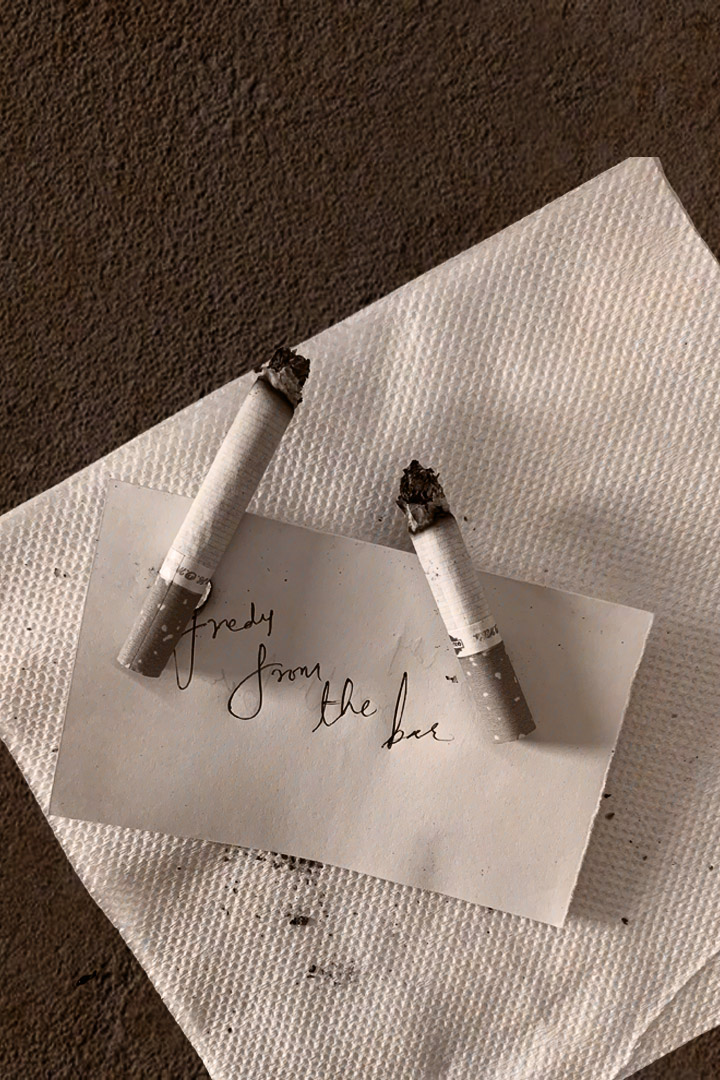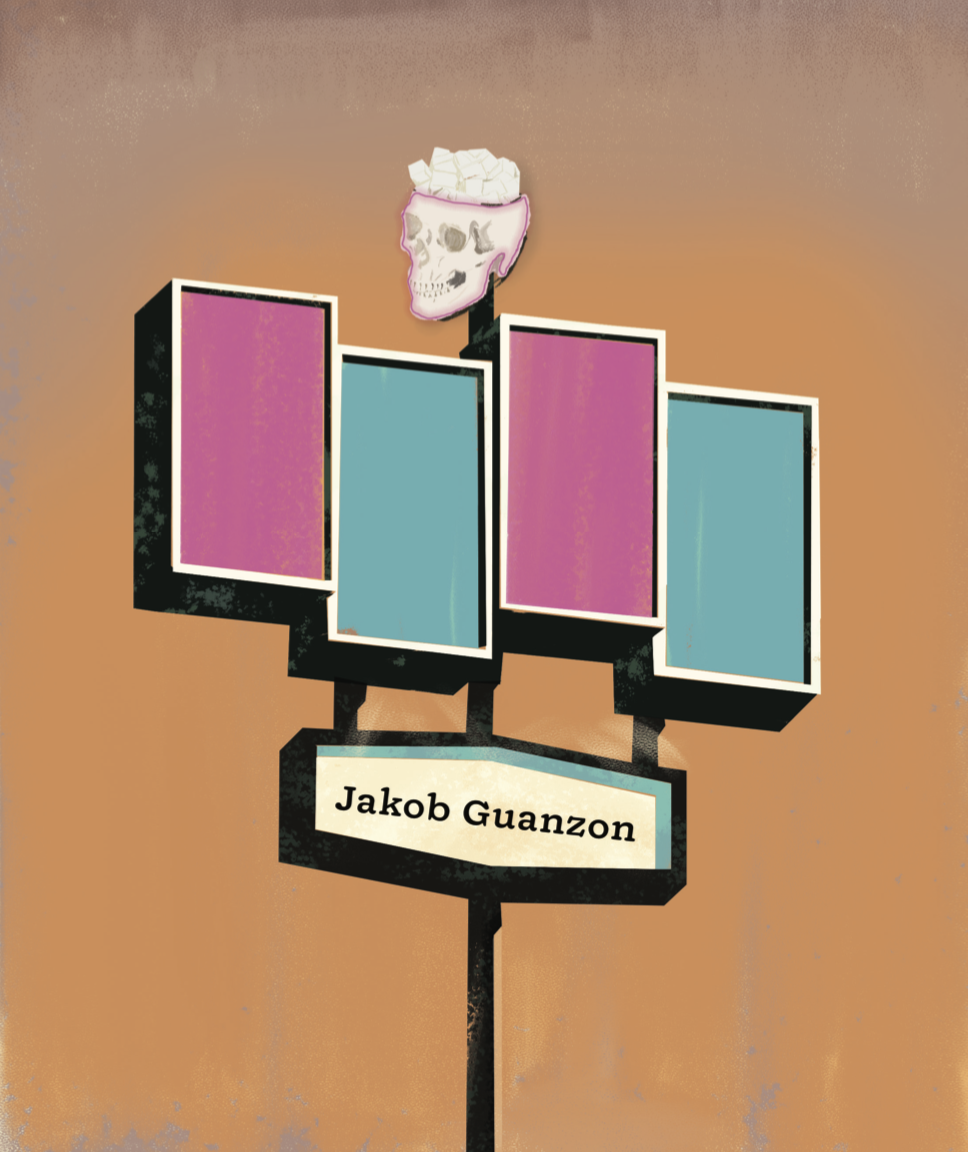Rolland doesn’t see us as Chesterfield people. But I know that we could be, we could try to be. It might take some time to adjust, to make it feel natural. I slide my fingers along the tufted edge of the mid-century couch. The salesman is wearing a skinny tie and tweed trousers and using words like haute and au courant. I should want this for us.
“Talk about an upgrade,” Rolland says once the salesman disappears around the corner.
We sit on the couch. It smells much earthier than leather, like a red-dirt cavern, like Mezcal. It swallows us both.
“This is nice,” Rolland says, stretching his arms across the back of the couch. “I feel presidential.”
“Regal,” I say.
We sit in silence, trying to make this fit. I think of our current couch, its dubiously stained cushions, its slight yet noticeable droop toward one side. We have only ever owned used and discarded furnishings. How strange to be the first in a lifetime of memories for this object.
“We deserve this,” he says.
Our first apartment was completely unfurnished, with the exception of a Creep Show poster and two canvas folding chairs. We were in our early twenties then, more than a decade ago, a lifetime behind us. We slept on a futon mattress, a makeshift pallet of hand-me-down quilts and flat, uncased pillows. My parents said that every respectable couple needed at least a couch and dinette. We told them that we were anything but respectable people.
During our second year in that apartment we added a rust-colored velour sofa, swathed in unsavory sateen fringe. It had been abandoned, left at the end of a driveway beside a trash bin, waiting to be saved. It was damp and souring but we liked it just fine. Stains can be hidden. Smells fade with time or you come to adopt them as your own.
“How very bohemian of us,” Rolland had said back then, “almost beatnik, really.”
The salesman informs us that we’ve been approved for six-month financing. While the image of Rolland reading the newspaper and myself beside him on our Chesterfield is desirable, buying a couch — this couch — is a heavy decision, both financially and spiritually. What if the Chesterfield is too big for us; what if we can’t live up to its demands? We can. We will. We sign the paperwork, drive home, and wait.
Friday morning the movers arrive with the Chesterfield, carrying it through the empty foyer archway and into the remarkably unfurnished living room of our condo. I suddenly feel ashamed of the room, for its nakedness and neglect. Three years and not a single picture on the wall. No shelves or trinkets. No lamp or decorative baskets. Just a room. When the movers leave, we hover awkwardly around the couch like two buoyant moons. The atmosphere is markedly changed with the new addition. The air is lighter, more fragrant, the ceiling is higher. There is a gulf of empty space around the couch vibrating with energy, with magnetism, as if it possesses its own gravitational force. I stand at the window looking out at our old, sad couch sitting beside the curb.
“We need new names,” I say.
“Harry,” he says, “and Margot.”
“Frederick and Josephine,” I say.
Five years ago, sitting beside me on the old couch in our old apartment, Rolland proposed. He was reading a book and asked it casually the way someone might ask your plans for the weekend ahead. Of course I had considered the possibility of marriage, but in that singular moment, that particular context, the subject seemed entirely alien.
“I’ll make tea,” I said.
I kissed him on the cheek, leaving him alone on the couch, and walked to the kitchen. I filled the kettle and set it warming on the stove.
“Would you like a cup?” I asked, our eyes meeting briefly through the hatch opening above the kitchen bar.
Having resumed his reading again he motioned apathetically with his hand something like I’m fine or Don’t trouble yourself but I removed two mugs from the cabinet all the same.
I walked down the hall and into the bathroom. Marriage. Marriage. I opened the medicine cabinet and found a pair of scissors. Someone’s wife. Rolland’s wife. I cut a four-inch lock from my hair. It fell to the bare tile floor like a bird shot mid-flight. I cut another and another and another, until the screaming kettle pulled me back into my body, into the bathroom, into the apartment on Maple Avenue with no furniture and Rolland’s grey-blue eyes. In the mirror I saw a version of me that was new and different and brave. She knew that change was unavoidable and so I knew it, too.
I returned to Rolland in the living room with two steaming cups of tea.
“New look,” he said.
“Yes,” I said, “I’m engaged now.”
We sit together in the empty room, on the new couch, in quiet contemplation, breathing in every subtle nuance. I remove my shoes and wedge my feet under Rolland’s thigh. The couch is rigid and cold. There is a knot in my chest.
“When I was small,” I say, “I would purposefully crush my fingers in drawers.”
Rolland’s head is tilted back, resting on the couch, his eyes are closed but his hand finds mine as he says, “I wet the bed until I was fourteen.”
I think of us now and how that was not so long ago. Back when someone could kiss your pain better and every day was a hill to climb, a feeling to discover then hide away, a secret you didn’t understand.
After a few moments I say, “Who are we now?”
He twists and pulls a button off the Chesterfield and buries it in the palm of my hand.
“Who do you want to be?”
We moved into our condo three years ago. After so many years of renting, Rolland though it might be nice to put down some roots. He used that word and I thought of my body sprouting tendrils from the soles of my feet that reached deep, down into the earth like chains. He found the condo and we scheduled a walk-through. He said it felt safe and permanent. He used the word sanctum. I could only think of words like cage or reliquary.
The night before we moved in I felt the transformation coming like an itch in the palm of my hands. I had this idea in my head that the condo represented real adulthood and some grand death of youth. This was the closing of so many open doors, the curtailing of a thousand possible things.
“I don’t know if I’m ready for this,” I said.
It was dark outside, the moon orange-gold and full beyond our bedroom window. Warm light trickled in through the spaces between blinds and spilled across our legs in bed.
“Get your jacket,” he said, sliding into his houseshoes.
He took his keys from the bedside table and walked out the door. I followed him, barefoot, draping a jean jacket over my shoulders like a cape.
We were headed down the interstate and Rolland had this incredible mad light in his eyes, like the bluest, hottest part of a flame. This is us, I thought. Right now, this is us. And it was.
“I’m Hoodoo Brown” he said, shooting a finger gun at my chest.
“Yes,” I said, “and I’m Calamity Jane.”
I’d never seen him so electric, the way he drummed on the steering wheel as we sped down moonlit pavement, throwing his head out of the window, howling like a wild thing. That night we stole twenty-five dollars worth of candy from a convenience store and climbed the county water tower. Up there, hovering in the night sky, miles away from the distant glowing city, we wrote our names on the cistern belly: Hoodoo & Calamity Forever.
Rolland and I are mid-thirty-something suburban condo owners with a Chesterfield. Ownership. I roll the word around in my mouth like hard candy. I want to tell Rolland that we could sell the condo, return the couch, and drive until we find something that fits us better, but instead I pull off another button and lob it across the room.
“A potted plant over there,” Rolland says, pointing to the far corner of the room, where the button totters and eventually falls still, “might make it feel more natural in here.”
“Yes,” I say, and I know that I am dangerously close to crying. “Maybe curtains, too.”
A moment passes as we sit there, both of us scanning the room for something to name, something to point to and say, this! this is what’s missing!
I stand up suddenly to face the couch and kick it with every ounce of strength my body can muster. My bare toes ache but I kick it again and again and again. Rolland sits patiently on the couch, observing me, moving slowly with it across the floor. He says nothing until I finally collapse, exasperated, returning to the couch beside him once more.
“Maybe tomorrow,” he says.
Yes, tomorrow. These things take time.
We move the Chesterfield back into the center of the room. It looks smaller now, more familiar and I feel an odd surge of affection for the couch, for its two missing buttons, for the abuse it has endured.
I look over my shoulder and watch a young couple load our old couch into the back of a red-brown pickup truck, like the color of blood when it dries and hardens on your skin. The couch extends beyond the tailgate and they fasten it haphazardly with rope. The man puts his hand on the couch and says something to the woman. I imagine he tells her, this is good for now. I will imagine them happy with our couch, our smells and stories, in their home. And tomorrow, I will imagine us happy here, too.





